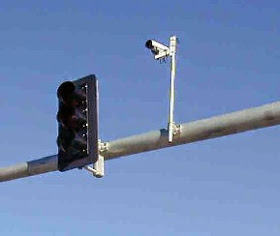What do these cameras do?
The overhead cameras you see at traffic signals are for detecting the presence of vehicles in order to provide the best distribution of green time based on traffic demand. They are cost-effective replacements for in-ground induction loops that are cut into the pavement.Are these cameras used for law enforcement?
No not for tickets! However, they can be used for license plate reader tracking depending on the city. These particular cameras are in no way tied to issuing tickets for the law enforcement system. They are for detecting the presence of vehicles, pedestrians, and bikes within their view.
Do the cameras issue red light camera tickets?
No!
What is the primary purpose of the cameras?
To control the traffic lights. The cameras are not focused on drivers, but instead on your vehicle as it moves towards the intersection. As your vehicle enters defined areas or "zones" within the camera's field of view, the camera's processor detects a change in the "zone". An output is sent to the traffic signal's controller (the computerized "brain" housed in a nearby metallic cabinet controlling the intersection's timing) that says a vehicle is requesting green time for its direction.
Do police use these cameras?
Yes, they use the cameras for asset tracking or reading license plates. This is helpful for law enforcement to track people and suspects. Amber alerts are one such use of camera video. Also known as ALPR or automatic license plate recognition.
Do these cameras capture video?
Yes and No! Some cameras offer surveillance or archiving of these images for a period of a few weeks. The camera view is a fixed focus, fixed location image. Depending on the camera the resolution of the images or video can be used to read license plates or distinguish facial features.
Can you get access to the video or footage?
Yes, and No! Depends on the city and if you need the footage for an accident I would suggest doing a Freedom of information act request. Also known as a FOIA request. Be persistent or you might not get a great response from cities who are reluctant about sharing this with people or insurance companies involved in accidents.



